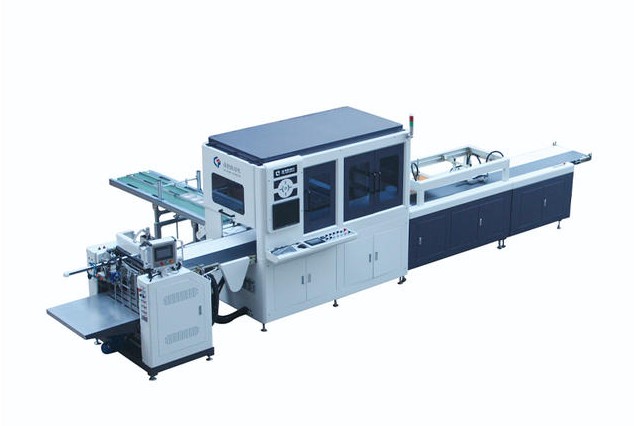In the ever-evolving landscape of manufacturing, precision is a non-negotiable factor, especially in high-volume production processes. This demand for accuracy has led to the rise of cutting-edge technologies, with the automatic case-making machine standing out as a key player in optimizing precision.

Introduction
In the world of manufacturing, where efficiency and accuracy reign supreme, the automatic case-making machine has emerged as a game-changer. As industries witness an increasing demand for high-volume production, the need for precision has never been more critical. This article delves into the intricate workings of automatic case-making machines, exploring how they play a pivotal role in optimizing precision in manufacturing processes.
Key Components of Automatic Case-Making Machines
To understand how these machines achieve precision, we must first examine their core components. Automatic case-making machines boast a sophisticated set of elements that work in unison to deliver unparalleled accuracy. Among these components are advanced cutting tools, state-of-the-art sensors, and precision-driven control systems.
These cutting-edge components are designed with one goal in mind: to elevate the precision levels of the manufacturing process. The synergy between these elements forms the backbone of the automatic case-making machine, allowing it to meet the stringent demands of high-volume production.
Precision Optimization Mechanisms
The optimization of precision in automatic case-making machines goes beyond hardware components. These machines leverage sophisticated software-driven solutions and algorithms to fine-tune their operations. This marriage of hardware and software ensures a seamless synchronization, enabling the automatic case-making machine to adapt dynamically to the intricacies of high-volume production.
The precision optimization mechanisms embedded in these machines allow for real-time adjustments, making them capable of handling diverse materials and production scenarios. Whether it's the intricacies of crafting specialized boxes or meeting tight tolerances, the automatic case-making machine excels in delivering precision at every stage of the production process.
Real-world Applications
To truly appreciate the impact of automatic case-making machines on precision, examining real-world applications is essential. Industries such as electronics, automotive, and medical devices, where precision is paramount, have witnessed transformative changes with the integration of these machines.
In the electronics sector, for instance, where miniaturization demands precise packaging, automatic case-making machines shine. Their ability to consistently produce intricate and customized boxes positions them as invaluable assets in high-tech manufacturing environments.
Factors Influencing Precision
While automatic case-making machines excel in optimizing precision, they operate in dynamic environments influenced by various factors. Material variations, environmental conditions, and fluctuating production demands can pose challenges to maintaining consistent accuracy. However, these machines are designed with adaptability in mind.
Automatic case-making machines incorporate advanced sensing technologies to detect and respond to variations in materials. Whether dealing with cardboard, corrugated material, or other substrates, the machines can dynamically adjust parameters to ensure precision remains uncompromised.
Quality Control Measures
Maintaining precision isn't just about initial setup; it's an ongoing process throughout production. Automatic case-making machines are equipped with built-in quality control measures that continuously monitor and verify the precision of each box produced.
Sophisticated sensors and monitoring systems detect deviations from set parameters, triggering corrective actions in real-time. This ensures that every box meets the required standards, providing manufacturers with the confidence that their high-volume production is characterized by unwavering precision.
User-Friendly Operation
One might assume that achieving high precision in manufacturing comes at the cost of complexity. However, automatic case-making machines are designed with user-friendliness in mind. Manufacturers can optimize precision without sacrificing ease of operation.
The intuitive interfaces and streamlined controls of these machines empower production personnel to navigate through intricate settings effortlessly. This ensures that even in the midst of high-volume demands, operators can maintain precision without compromising on operational efficiency.
Addressing User Concerns
Prospective buyers exploring automatic case-making machines often have concerns about integration, maintenance, and long-term performance. Addressing these concerns is crucial to instilling confidence in the decision to invest in these machines.
Manufacturers offering automatic case-making machines for sale typically provide comprehensive support. This includes training programs for operators, detailed maintenance schedules, and transparent information about the long-term durability and performance of the machines.
Future Trends in Precision Optimization
As technology continues to advance, the future of precision in manufacturing with automatic case-making machines looks promising. Emerging trends indicate a continued focus on pushing the boundaries of precision through innovative technologies.
Automation, artificial intelligence, and machine learning are expected to play pivotal roles in further enhancing the precision capabilities of these machines. Manufacturers keen on staying ahead of the curve should explore how these evolving trends can be integrated into their production processes.
Conclusion
In conclusion, the automatic case-making machine stands as a beacon of precision in high-volume production processes. Through its intricate combination of cutting-edge components, software-driven optimization, and adaptability to various factors, these machines have redefined the standards of accuracy in manufacturing.
For those in search of box-making machines for sale, understanding the mechanisms behind precision optimization is key. The user-friendly nature of these machines, coupled with robust quality control measures, addresses concerns and ensures a seamless integration into diverse production environments.
As we look toward the future, the continuous evolution of technology promises even greater precision, solidifying the automatic case-making machine's role as an indispensable asset in the dynamic landscape of modern manufacturing.
 English
English





